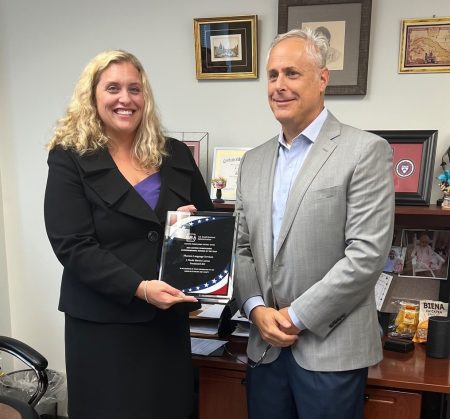Ashley Kimler | (TNS) Bankrate.com
Coping with the loss of a loved one is a difficult emotional experience. However, it’s crucial to handle the deceased person’s financial matters and protect their credit information amidst the grieving process. The first important step is to request a credit freeze.
By doing this, you can protect their financial status and prevent potential fraud or identity theft for yourself and other loved ones.
Why a credit freeze is important after a loved one passes away
A credit freeze serves as a lock on the person’s credit report, making it more challenging for identity thieves to use their details for fraud.
When a loved one dies, their financial information becomes vulnerable. Freezing their credit will:
—Prevent identity theft
—Stop fraudulent opening of new accounts in their name
—Safeguard sensitive information
Without a credit freeze, the deceased person's personal data, like their Social Security number (SSN), could be stolen and used to open credit cards or other financial accounts. Criminals may use obituaries, death certificates, and other information to steal the identities of deceased individuals, causing issues for their living relatives by opening new accounts or committing crimes using the deceased's name.
Freezing credit makes it significantly harder for thieves to open new accounts or misuse existing ones.
How to inform credit bureaus of a death
Initiating a credit freeze for a deceased loved one involves a few simple steps:
1. Collect your loved one’s personal details
Before informing the credit bureaus about a loved one’s death, you will need to gather specific information and documentation:
—The complete legal name of the deceased person as it appears on official documents.
—The deceased person’s SSN, which is crucial for identifying their credit file.
—The deceased person’s date of birth.
—The date of the individual's passing.
—A copy of their death certificate.
If you are the spouse or shared a credit file with the deceased, your own identification may be required.
If you are not the spouse, you may need to provide evidence that you are authorized to act on behalf of the deceased, such as a copy of a will, executor agreement, or power of attorney documentation.
Having this information readily available will ensure a smooth and efficient process when you contact the credit bureaus.
2. Send letters to inform the credit bureaus
The three main credit bureaus, Transunion, Equifax, and Experian, need to be informed of the death. The first bureau you contact will notify the other two on your behalf.
However, one bureau cannot necessarily initiate a credit freeze across all three bureaus. Therefore, you should contact all three bureaus and send copies of all necessary documents with each letter.
Use this basic template to inform the credit bureaus of your loved one’s death and request a credit freeze:
[Your Name]
[Your Address]
[City, State, Zip Code]
[Your Phone Number]
[Date]
[Credit Bureau’s Name]
[Credit Bureau’s Address]
[City, State, Zip Code]
Subject: Notification of Death and Request for Credit Freeze
To whom it may concern,
I am letting you know that [Name of Deceased], who was my [relationship to you, e.g., spouse], has passed away on [Date of Death]. I kindly ask you to put a freeze on [his/her] credit report to prevent any potential fraud or unauthorized access.
I have included a copy of the death certificate for [Name of Deceased] as evidence. Please freeze [his/her] credit report and mark it as “deceased — do not issue credit.”
I would also like to request a final copy of [Name of Deceased]’s credit report for my records.
Thank you for addressing this promptly. Please let me know when you receive the notification and when the credit freeze has been put in place.
Sincerely,
[Your Name]
You can adjust this template and add any relevant information to your situation. Make sure to keep a copy for your records.
Once you’ve drafted your letter, you can send it to one or all of the major credit bureaus via postal mail. Be sure to attach copies of identifying documents and send each letter via certified mail.
The appropriate contact addresses for notifying credit bureaus of a death are as follows:
Transunion, P.O. Box 2000, Chester, PA 19016
Experian, P.O. Box 9701, Allen, TX 75013
Equifax Information Services LLC, P.O. Box 105139, Atlanta, GA 30348-5139
Times for the credit freeze may vary. Transunion The credit bureaus will update the individual’s credit report within five days of receiving the documents and send you a confirmation letter. Experian They will add a death notice to your loved one’s credit report upon receiving notification from the Social Security Administration or the requestor. Equifax They will add a death notice to your departed’s credit report upon receiving the documents.
3. Confirm the freeze and ensure the account is flagged as deceased
After sending your request to the credit bureaus, confirm that they have initiated the credit freeze and properly flagged the deceased individual’s account:
—Allow some time for the credit bureaus to process your request. This typically takes a few days or up to a couple of weeks.
—Reach out to each of the three major credit bureaus — TransUnion, Experian and Equifax — either via phone or online.
—Ask them to verify that they have received your request to freeze the deceased individual’s credit report.
—Ask if the deceased’s account has been appropriately flagged as “deceased — do not issue credit” to protect their information from potential fraud.
5. Request a copy of your loved one’s credit report
While you are in contact with the credit bureaus, you should also request a copy of your loved one’s credit report. This will confirm that the report has been marked “deceased” and that a permanent credit freeze is in place.
You can also use the credit report to assess your loved one’s financial standing. Read the credit report carefully to identify any discrepancies and all outstanding accounts, and note any accounts that need your attention.
How to settle your loved one’s financial affairs
Once you’ve taken steps to freeze credit, it’s important to deal with your loved one’s outstanding financial obligations.
You might take over some of the debts they had if you are their spouse or recipient. Whether you are responsible for repaying those debts depends on the terms of the accounts and your state’s laws. In certain situations, it is inevitable that the responsibility for the debt will be transferred upon death.
For example, if you both had debts with your loved one, like mortgages or shared credit card accounts, you may be accountable for them, no matter who incurred the charges. Similarly, if someone co-signed a loan or credit card for the deceased, they will be liable for that debt.
If the deceased had a loan using the equity of their home on an inherited residence, the inheritor would need to repay it. Timeshares and their maintenance fees will also become the responsibility of the inheritors if their names are on the deed.
Family members who approved medical treatment may need to pay any medical bills that are not covered, depending on state laws and document terms.
Get in touch with your loved one’s creditors to:
—Close accounts
—Handle tax paperwork
—Resolve outstanding balances
In some cases, accounts may be automatically closed when a person passes away. However, some accounts may still require settlement, either partially or fully, even after the account holder’s death.
The main point is
Freezing the credit of a deceased loved one is an important measure to protect their financial legacy. By taking the appropriate steps and organizing important documents, you can safeguard their private information and manage financial matters with minimal stress.
Take each step cautiously — and seek professional help if necessary — to respect your loved one’s financial well-being even after their passing.
Frequently asked questions
—How do you close your deceased relative’s accounts?
Make several copies of the death certificate and notify each of the relevant parties with this evidence. Request closure of the account and settle any overdue balances when necessary. Monitor your relative’s credit reports for fraudulent activity while you’re waiting for a credit freeze to take effect with the credit bureaus.
—Do you need to notify the IRS when someone dies?
Yes. When someone dies, you or the appointed representative need to file the deceased person’s final tax return. On this return, you must indicate the person’s death. Currently, the IRS does not require any other notification of the death, but you should always check irs.gov for the latest tax information.
—Can a credit freeze be lifted temporarily, such as for estate-related transactions?
A credit freeze can be temporarily lifted upon request. However, lifting a freeze can expose the account holder’s credit information to the risk of fraud.
(Visit Bankrate online at bankrate.com.)
©2024 Bankrate.com. Distributed by Tribune Content Agency, LLC.









